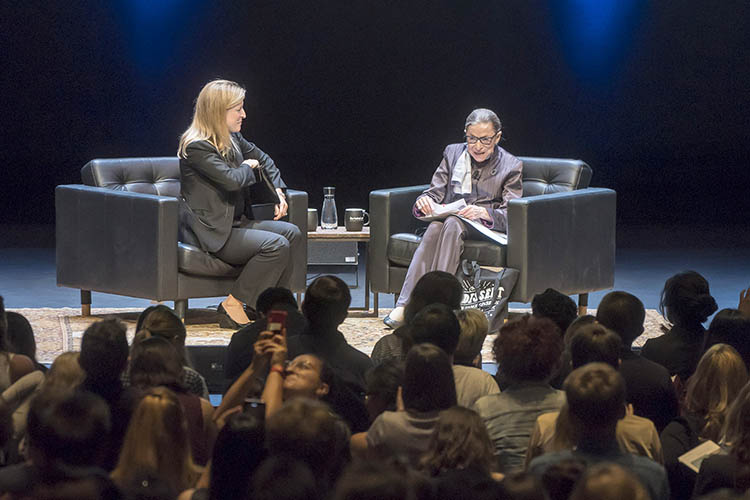Berkeley Talks: Supreme Court Justice Ruth Bader Ginsburg on overcoming the odds
The U.S. Supreme Court Justice talks about the challenges she faced as a woman in a male-dominated field, how "overjoyed" she is that women are now welcomed at the bar and on the bench and how unconscious bias is still a problem
December 14, 2019
Subscribe to Berkeley Talks, a Berkeley News podcast that features lectures and conversations at UC Berkeley.

U.S. Supreme Court Justice Ruth Bader Ginsburg gives Berkeley Law’s inaugural Herma Hill Kay Memorial Lecture in Zellerbach Hall on Oct. 21, 2019. (Berkeley Law photo by Jim Block)
At 13, Ruth Bader Ginsburg wrote an article in her school paper about the importance of the Magna Carta, the Bill of Rights and the Declaration of Independence. But she didn’t think about pursuing a career in law because she didn’t see any women in the field.
When she began college at Cornell, however, she learned about how attorneys were defending people called in for questioning during the wave of Communist accusations led by Senator Joe McCarthy. In reading about their advocacy, “I got the idea that being a lawyer was a pretty nifty thing,” said Ginsburg at an Oct. 21 event at UC Berkeley.
Ginsburg, who, at 86, is the oldest U.S. Supreme Court Justice, gave Berkeley Law’s inaugural Herma Hill Kay Memorial Lecture to a packed house of Berkeley Law students, faculty and staff in Zellberbach Hall.
Ginsburg and Kay, who both graduated from law school in 1959, were trailblazers for women in the law and gender equality. They met at a conference on women in the law in 1971, and went on to co-author the first casebook on sex-based discrimination. They were good friends for decades before Kay, who taught for 57 years at Berkeley Law and was its first woman dean, died in 2017.
During the lecture, Ginsburg talks about the challenges she faced as a woman in a male-dominated field, how “overjoyed” she is that women are now welcomed at the bar and on the bench, how unconscious bias is still a problem — and the “zest for life” she has after having survived several bouts of cancer.
Read more about the event on Berkeley Law’s website.
Watch a video of the conversation between Ginsburg and Berkeley Law professor and Ginsburg’s former clerk, Amanda Tyler.